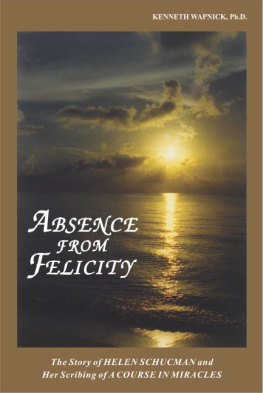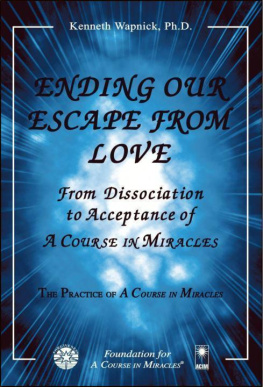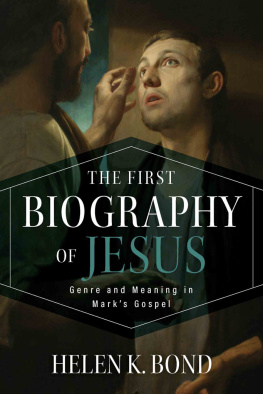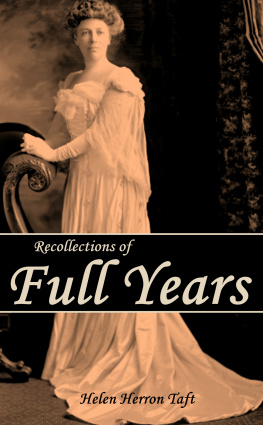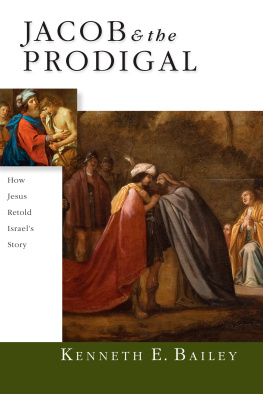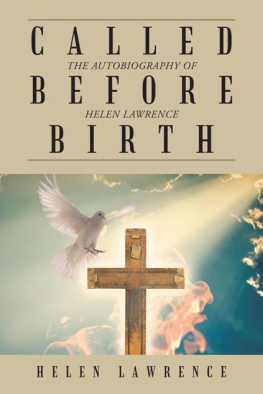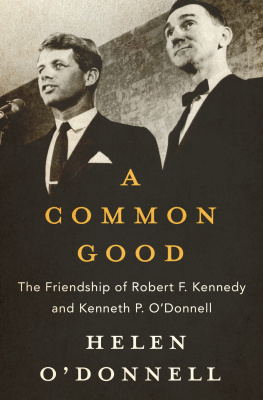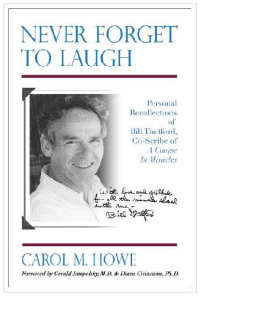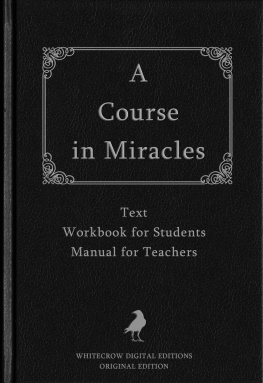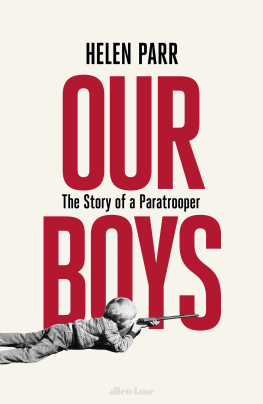The Story of HELEN SCHUCMAN and Her Scribing of A COURSE IN MIRACLES
Absence from Felicity
The Story of Helen Schucman and Her Scribing of A Course in Miracles
Kenneth Wapnick, Ph.D.
Copyright 2015 by the Foundation for A C ourse in M iracles
41397 Buecking Drive Temecula, CA 92590 www.facim.org
All rights reserved under International and Pan-American Copyright Conventions. No part of this book may be reproduced or transmitted in any form or by any means, electronic or mechanical, including photocopying, recording, or by any information storage and retrieval system, without permission in writing from the publisher. For information, contact the Director of Publications at the Foundation for A C ourse in M iracles 41397 Buecking Drive Temecula, CA 92590.
Portions of A Course in Miracles copyright 1992, 1999
Psychotherapy: Purpose, Process and Practice copyright 1976, 1992
The Song of Prayer copyright 1978, 1992
The Gifts of God copyright 1982
by the Foundation for Inner Peace. Used by permission.
The Unpublished Writing of Helen Schucman, Volumes 1-22 copyright 1990 Kenneth Wapnick, used by permission.
ISBN 978-1-59142-859-6
Dedication
FOR HELEN
Into Christ's Presence has she entered now, serenely unaware of everything except His shining face and perfect Love. The vision of His face will stay with her, but there will be an instant which transcends all vision, even this, the holiest. This she will never teach, for she attained it not through learning. Yet the vision speaks of her rememberance of what she knew that instant, and will surely know again.
(Adapted from A Course in Miracles , workbook Lesson 157)
NOTE TO SECOND EDITION
For this new edition, the book has been retypeset. There have been some minor editorial revisions, and an index of references to A Course in Miracles included as well. The notation for these references has been revised so that it correlates with the numbering system used in the second edition of the Course and the two scribed supplements, Psychotherapy: Purpose, Process and Practice and The Song of Prayer.
PREFACE
Helen Schucman, the subject of this book, was the scribe of A Course in Mirades.
One afternoon, several years after the Course was completed, Helen and I were sitting on her living room couch, our favorite spot when the weather was not conducive to walking. We began to discuss the distortions about her life and the Courses origins that were already beginning to be heard, and this at a time when she was still very much alive. Imagine, we thought out loud, what would happen after she was gone. Helen, incidentally, seemed rather certain that she would die at the age of seventy-two, that being the number written on her tombstone she had seen in a vision. In point of fact, she died about five months short of her seventy-second birthday. While I do not recall the exact date of our conversation on the couch, it was most likely around two or three years before Helens death in 1981.
It was mutually understood by us that her unpublished auto-biography was hardly a true and accurate account of her life, being rather an overly stylized, literary renderingher public stancethat did not truly reflect the deeper level of Helens feelings and experiences. Our one attempt to correct the inaccuracies and edit out the distortions, while an improvement in some places, proved in many others to be even worse than the original. Recounting certain events in her lifeespecially those of a religious nature, and even more specifically, those events surrounding A Course in Miracles aroused tremendous anxiety in Helen, and her discomfort directly led to an almost fierce over-editing that affected the faithfulness of her lifes retelling. It was out of this context, therefore, that I said to Helen that I would write her story, as well as the related eventsinner and outerthat preceded, accompanied, and followed her taking down the Course.
Helen agreed that this was a good idea, and then, as one of us would often do, I quoted from our mutually favorite literary work, Hamlet. It was from the final scene where Hamlet is dying of the poisoned cup, and his trusted Horatio begins to drink the poison to join his friend in death. Hamlet quickly seizes the cup from Horatios hands, exclaiming:
O good Horatio, what a wounded name,
Things standing thus unknown, shall live behind me!
If thou didst ever hold me in thy heart,
Absent thee from felicity awhile,
And in this harsh world draw thy breath in pain,
To tell my story [i].
I hardly think this is a harsh world, nor do I experience my surviving Helen as painful, nor did I think that way then. However, I had some premonitions of what the world would do to Helenwhat a wounded name ... shall live behind me!unable to resist the temptation to sensationalize, mythologize, or otherwise distort her life and experiences. This I knew would only obscure the truth of what was an inspiring and powerful story simply by being what it was, without need to have it conform to Hollywood standards. And so the need for a biography I would writeas I truly held her in my heartthat would more closely reflect Helens experience: a life dedicated to bringing forth the message of Jesus, and yet a life that was in truth, in Helens conscious experience at least, an absence from felicity.
Indeed, some distorted accounts of Helen and the origins of A Course in Miracles have already begun to appear, and these do not do justice to: 1) Helens true experience of God and Jesus; 2) the uniqueness of what appeared to be her dual personality of a highly developed spiritual self coupled with an almost equally highly developed ego; and 3) her relationship with William Thetford, that on one level was the direct stimulus and provided the setting for the transmission of the Course. A major purpose of this book, therefore, is to chronicle the unusually ambivalent relationship Helen had with God and Jesus, beginning with her childhood and continuing on through the scribing of the Course to the moment of her death in 1981.
The book, however, is not a conventional biography, for it does not present a complete nor totally linear view of Helens life. Nor is it a psychobiography, a genre that has been somewhat in favor in our Freudian age. Echoing A Course in Miracles , this book reflects a particular point of view; namely, that the aforementioned conflict in Helen between these parts of her selfwanting to return to God and the fear of such returnis the predominant theme in everyones life, independent of familial and/or hereditary circumstances. This was a conflict that symbolized both sides of Helens personality, and reflected the same ambivalence we all share regarding our relationship with God and with the person of Jesus, whose love for us was the closest the world has come to experiencing the resplendent Love of God, our Source.
In chronicling the development of this personal conflict, and its ultimate resolution, I thus am writing everyones story. The drama of this aspect of Helens inner life reflects the inner life of all people, seemingly trapped in a Godless world and wandering uncertain, lonely, and in constant fear (T-31.V nL 7:1), yet all the time yearning to hear the Call of the loving God that would lead them back to Him. I therefore, for the most part, do not dwell on Helens worldly lifethe form except insofar as it reflects the underlying content of this conflict. Analyzing the ego is fruitless, as the Course repeatedly instructs us. On the other hand, understanding that the entire ego thought system is a defense against our true Self is extremely helpful. Thus, for example, Helens clear ambivalence towards her parents and organized religionproviding a goldmine of data for a psychologist seeking to find psychodynamic causes for her inner experiencesis here seen as reflective of this deeper God-ego conflict, not its cause.

